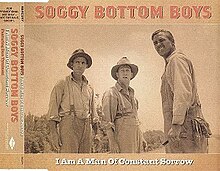Man of Constant Sorrow
| "I Am a Man of Constant Sorrow" | |
|---|---|
| Song by Emry Arthur | |
| Released | January 18, 1928 |
| Format | Gramophone record |
| Genre | Old-time |
| Length | 3:18 |
| Label | Vocalion Records |
| "I Am a Man of Constant Sorrow" | |
|---|---|
| Song by The Stanley Brothers | |
| Released | May 1951 |
| Format | Vinyl |
| Recorded | November 3, 1950 |
| Genre | Folk, Bluegrass |
| Length | 2:56 |
| Label | Columbia Records |
| "Man of Constant Sorrow" | |
|---|---|
| Song by Ginger Baker's Air Force from the album Ginger Baker's Air Force | |
| Released | March 1970 |
| Format | Vinyl |
| Genre | Rock |
| Length | 3:31 |
| Label | ATCO Records, Polydor |
| "I Am a Man of Constant Sorrow" | ||
|---|---|---|

"I Am a Man of Constant Sorrow" cover
|
||
| Song by The Soggy Bottom Boys from the album O Brother, Where Art Thou? | ||
| Released | December 5, 2000 | |
| Format | CD, Music download | |
| Genre | Bluegrass, country, folk, blues | |
| Length | 4:20 | |
| Label | Mercury Nashville | |
| Producer(s) | ||
| Music sample | ||
|
|
||
"Man of Constant Sorrow" (also known as "I Am a Man of Constant Sorrow") is a traditional American folk song first published by Dick Burnett, a partially blind fiddler from Kentucky. The song was originally titled "Farewell Song" in a songbook by Burnett dated to around 1913. An early version was recorded by Emry Arthur in 1928, which gave the song its current titles.
There exist a number of versions of the song that differ in their lyrics and melodies. The song was popularized by The Stanley Brothers who recorded the song in the 1950s, and many versions were recorded in the 1960s, most notably by Bob Dylan. Variations of the song have also been recorded under the titles of "Girl of Constant Sorrow" by Joan Baez, "Maid of Constant Sorrow" by Judy Collins, and "Sorrow" by Peter, Paul and Mary. In 1970 the song was recorded by Ginger Baker's Air Force, with vocals by Denny Laine, and reached No. 85 on the Billboard Chart.
Public interest in the song was renewed after the release of the 2000 film O Brother, Where Art Thou?, where it plays a central role in the plot. The song, with lead vocal by Dan Tyminski, was also included in the film's highly successful, multiple-platinum-selling soundtrack. This recording won a Grammy for Best Country Collaboration at the 44th Annual Grammy Awards in 2002.
The song was first published in 1913 as "Farewell Song" in a six-song songbook by Dick Burnett, titled Songs Sung by R. D. Burnett—The Blind Man—Monticello, Kentucky. Some uncertainty however exists as to whether Dick Burnett himself wrote the song. In an interview he gave toward the end of his life, Burnett himself indicated he could not remember:
...
Wikipedia
